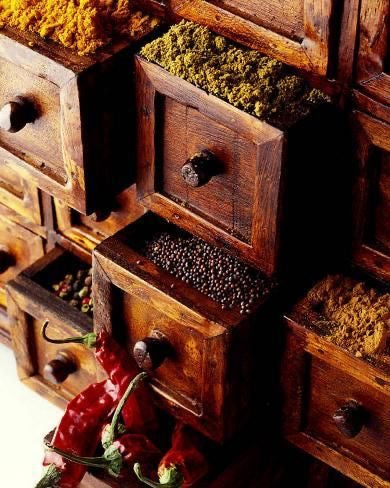
Building Immunity with Herbs
(and an immune supporting holiday recipe!)
Winter is a time of festivity, family visits, chilly weather – and the not-so-lovely cold and flu season. As we enter into the depths of winter, this is a great time to consider taking proactive measures to strengthen our immune systems. Herbalism offers many herbal allies to act as supporters and guardians of our immunity.
In herbalism there are a variety of approaches to utilizing herbs for the immune system. When in an acute phase of illness, we can support our bodies with immune stimulating and antiviral herbs in order to bolster the immune system's ability to fight pathogens. Immune stimulating herbs like echinacea, elderberry and yerba santa can assist us when we’re actively fighting an illness, however they can be overly stimulating to the immune system if used long term.
Throughout the cold and flu season, by focusing on fortifying the immune system, we become less susceptible to the bugs that are inevitably going to be around. To build immune system strength over time, we can look to tonic adaptogenic herbs. Adaptogenic herbs help modulate and bolster immune system function, giving us an extra layer of protection as we go through this time of year. Stress also plays a role in lowering immunity, and no doubt the holidays can be a time of increased stress. Luckily, adaptogens also help mitigate the stress response, helping us to become more resilient in the face of stressors.
Warming herbs are another wonderful choice to support our health and immune strength. Warming herbs like ginger, cayenne or cinnamon bring heat into our systems, increasing circulation, supporting optimal digestion – and many have long-standing uses as cold or flu remedies. Beyond that, digestive health is intimately linked with immunity, so any herb that supports digestive function is also a friend to the immune system.
Some easy and delicious ways to incorporate immune fortifying herbs into your routine can be to add them into soups or warming beverages. Immune modulating medicinal mushrooms such as reishi and turkey tail work well in soups, along with the versatile astragalus. Both adaptogenic herbs and warming herbs like ashwagandha and ginger work wonderfully in chai teas, herbal lattes and other wintery beverages. The fun and holiday appropriate recipe we’ll be sharing here is an adaptogenic immune-supporting apple cider.
In this immune supportive apple cider, there is a mix of adaptogenic and warming herbs. Some can be found at any grocery store, while others can be found at most apothecaries or online.
Featured herbs:
Codonopsis (codonopsis pilosula) - Sometimes referred to as “the other ginseng,” codonopsis is a Traditional Chinese Medicine adaptogenic herb that is used to build vitality, support Qi (aka lifeforce energy!) and tonify the immune system. It can help replenish a depleted system, or help us from becoming depleted by life’s stressors. Codonopsis is tasty and gentle enough for children, making it a great herb to support the entire family!
Astragalus (astragalus membranaceus) - Astragalus is a beloved and well known herb for immune health. It has a long standing use in Traditional Chinese Medicine for strengthening the Wei Qi, which, from the TCM perspective, is the defensive barrier of Qi that protects your system from pathogens. In plain terms, astragalus works to strengthen and fortify the immune system, ideally to the point where your immunity is so strong it knocks out pathogens without you even knowing!
*It is not recommended to take astragalus in times of active illness*
Ginger (zingiber officianle) - Not just for curries and soups, ginger holds a place in every herbalist’s repertoire, due to its bountiful medicinal properties. It is wonderful for digestive complaints of any kind, highly antiinflammatory and supportive for the cardiovascular system, to name a few. Ginger’s warming properties are wonderful for keeping our internal flame and vitality strong throughout the cold time of year, by way of supporting circulation, digestion and the movement of Qi throughout the body. In case we do fall ill, ginger is also useful for lessening the severity and duration of cold or flu symptoms.
Cinnamon (Cinnamomum verum, cassia) - So initially we must discuss the types of cinnamon. Yes there’s a few! The cinnamon that holds the most medicinal benefits is Ceylon cinnamon, so when selecting a cinnamon for medicinal properties, go for the Ceylon. If you can’t access the Ceylon, the standard cassia cinnamon will do! Pungent and warming, cinnamon brings heat and movement to the body, supporting digestion and circulation. Cinnamon is a lovely additive that can bring additional medicinal benefits and improved taste to any winter-y herbal concoction you may be creating!
Herbal Apple Cider Recipe
- one quart organic apple juice
- 4 astragalus root strips
- 2 tablespoons codonopsis root
- 4-6 cinnamon sticks or 1-2 tablespoons cinnamon chips
- 3 cloves
- 4 cardamom pods, cracked
- 2 star anise pods
- 1 orange, thinly sliced
- Small thumb of ginger, sliced
- Optional additions: vanilla bean, allspice, cranberries
Directions:
- Place all ingredients in a large pot, cover and bring to a simmer
- Simmer for 20-30 minutes
- Strain, garnish with an orange slice and star anise pod
- Enjoy and be well!
——————

Amma Rosavalon is an herbalist that is based locally in Southern Oregon. Her practice is informed by the seasons & rhythms of the land around her. And her approach is a unique integration of clinical herbalism, self care practices, dietary adjustments, ritual & nature connection.
Amma trained in bioregional herbalism, Ayurveda, ethical wildcrafting and clinical herbalism through the Hawthorn Institute and has continued to devote herself to the path of herbal medicine ever since. She believes everyone deserves access to herbal medicine, holistic health support and connection to nature. Amma is honored to serve as a conduit in this way.
You can find her on Instagram @mamma.amma and online at https://www.ammarosavalon.com/
Leave a comment